英语动词不定式的完成式用法小结
不定式知识点归纳总结
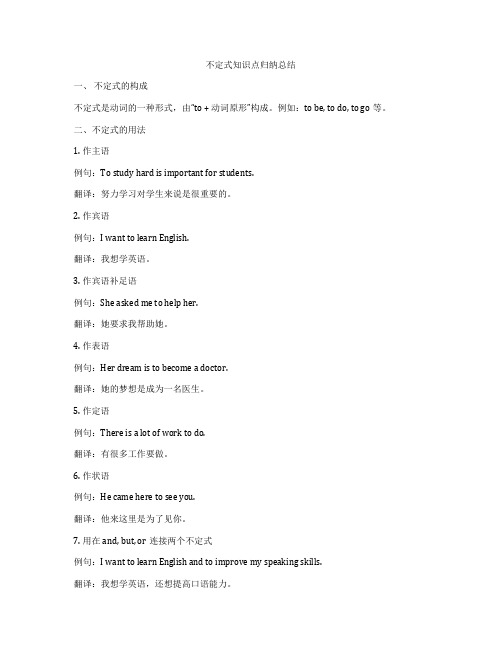
不定式知识点归纳总结一、不定式的构成不定式是动词的一种形式,由“to + 动词原形”构成。
例如:to be, to do, to go等。
二、不定式的用法1. 作主语例句:To study hard is important for students.翻译:努力学习对学生来说是很重要的。
2. 作宾语例句:I want to learn English.翻译:我想学英语。
3. 作宾语补足语例句:She asked me to help her.翻译:她要求我帮助她。
4. 作表语例句:Her dream is to become a doctor.翻译:她的梦想是成为一名医生。
5. 作定语例句:There is a lot of work to do.翻译:有很多工作要做。
6. 作状语例句:He came here to see you.翻译:他来这里是为了见你。
7. 用在and, but, or连接两个不定式例句:I want to learn English and to improve my speaking skills.翻译:我想学英语,还想提高口语能力。
8. 与形容词和副词连用例句:I'm happy to meet you.翻译:见到你我很高兴。
9. 用在名词前表示目的,结果等例句:He gave us some advice to help us study better. 翻译:他给了我们一些建议,帮助我们更好地学习。
三、不定式的特殊用法1. with + 宾语 + 不定式例句:He left me with nothing to say.翻译:他让我无话可说。
2. for + 宾语 + to 不定式例句:We have a lot of work for you to do.翻译:我们有很多工作需要你做。
3. 不定式的被动形式例句:The book is difficult to finish.翻译:这本书难以完成。
动词不定式的完成式用法
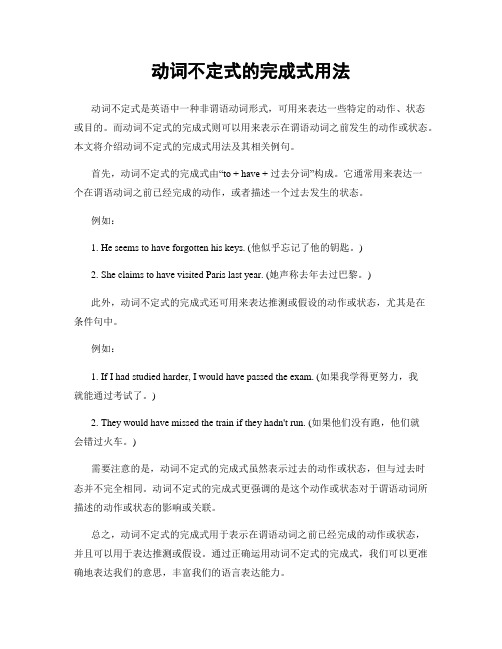
动词不定式的完成式用法动词不定式是英语中一种非谓语动词形式,可用来表达一些特定的动作、状态或目的。
而动词不定式的完成式则可以用来表示在谓语动词之前发生的动作或状态。
本文将介绍动词不定式的完成式用法及其相关例句。
首先,动词不定式的完成式由“to + have + 过去分词”构成。
它通常用来表达一个在谓语动词之前已经完成的动作,或者描述一个过去发生的状态。
例如:1. He seems to have forgotten his keys. (他似乎忘记了他的钥匙。
)2. She claims to have visited Paris last year. (她声称去年去过巴黎。
)此外,动词不定式的完成式还可用来表达推测或假设的动作或状态,尤其是在条件句中。
例如:1. If I had studied harder, I would have passed the exam. (如果我学得更努力,我就能通过考试了。
)2. They would have missed the train if they hadn't run. (如果他们没有跑,他们就会错过火车。
)需要注意的是,动词不定式的完成式虽然表示过去的动作或状态,但与过去时态并不完全相同。
动词不定式的完成式更强调的是这个动作或状态对于谓语动词所描述的动作或状态的影响或关联。
总之,动词不定式的完成式用于表示在谓语动词之前已经完成的动作或状态,并且可以用于表达推测或假设。
通过正确运用动词不定式的完成式,我们可以更准确地表达我们的意思,丰富我们的语言表达能力。
英语动词不定式的完成体解读
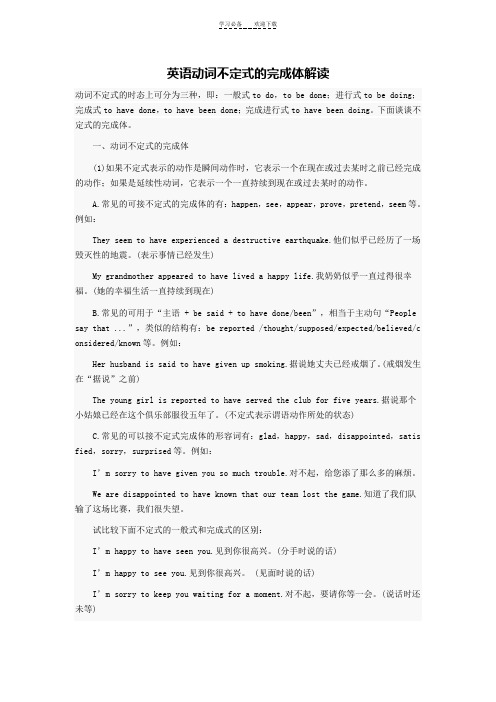
英语动词不定式的完成体解读动词不定式的时态上可分为三种,即:一般式to do,to be done;进行式to be doing;完成式to have done,to have been done;完成进行式to have been doing。
下面谈谈不定式的完成体。
一、动词不定式的完成体(1)如果不定式表示的动作是瞬间动作时,它表示一个在现在或过去某时之前已经完成的动作;如果是延续性动词,它表示一个一直持续到现在或过去某时的动作。
A.常见的可接不定式的完成体的有:happen,see,appear,prove,pretend,seem等。
例如:They seem to have experienced a destructive earthquake.他们似乎已经历了一场毁灭性的地震。
(表示事情已经发生)My grandmother appeared to have lived a happy life.我奶奶似乎一直过得很幸福。
(她的幸福生活一直持续到现在)B.常见的可用于“主语 + be said + to have done/been”,相当于主动句“People say that ...”,类似的结构有:be reported /thought/supposed/expected/believed/c onsidered/known等。
例如:Her husband is said to have given up smoking.据说她丈夫已经戒烟了。
(戒烟发生在“据说”之前)The young girl is reported to have served the club for five years.据说那个小姑娘已经在这个俱乐部服役五年了。
(不定式表示谓语动作所处的状态)C.常见的可以接不定式完成体的形容词有:glad,happy,sad,disappointed,satis fied,sorry,surprised等。
英语非谓语动词用法总结
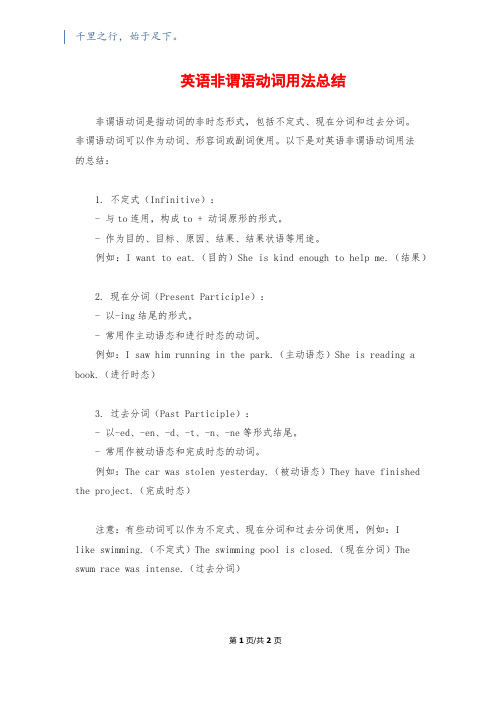
千里之行,始于足下。
英语非谓语动词用法总结非谓语动词是指动词的非时态形式,包括不定式、现在分词和过去分词。
非谓语动词可以作为动词、形容词或副词使用。
以下是对英语非谓语动词用法的总结:1. 不定式(Infinitive):- 与to连用,构成to + 动词原形的形式。
- 作为目的、目标、原因、结果、结果状语等用途。
例如:I want to eat.(目的)She is kind enough to help me.(结果)2. 现在分词(Present Participle):- 以-ing结尾的形式。
- 常用作主动语态和进行时态的动词。
例如:I saw him running in the park.(主动语态)She is reading a book.(进行时态)3. 过去分词(Past Participle):- 以-ed、-en、-d、-t、-n、-ne等形式结尾。
- 常用作被动语态和完成时态的动词。
例如:The car was stolen yesterday.(被动语态)They have finished the project.(完成时态)注意:有些动词可以作为不定式、现在分词和过去分词使用,例如:Ilike swimming.(不定式)The swimming pool is closed.(现在分词)The swum race was intense.(过去分词)第1页/共2页锲而不舍,金石可镂。
此外,非谓语动词还有一些特殊的用法和结构,包括不定式的被动形式、独立结构、状语从句、动名词(-ing形式)和不定式的短语等。
总之,非谓语动词在英语语法中发挥重要作用,熟练掌握其用法对于正确使用英语具有重要意义。
动词不定式时态的用法

动词不定式时态的用法动词不定式是一种非谓语动词形式,由“to +动词原形”构成。
它具有名词、形容词和副词的特征,在句子中可以充当主语、宾语、定语、状语、宾语补足语等成分。
动词不定式的时态有一般式、进行式、完成式和完成进行式,下面我们来详细了解一下它们的用法。
一、一般式(to do)动词不定式的一般式表示的动作通常与谓语动词的动作同时发生或在其后发生。
1、表示将来的动作例如:“I have a lot of work to do tomorrow”(明天我有很多工作要做。
)这里的“to do”表示将来要做的工作。
2、用于某些动词后作宾语常见的这类动词有:want, hope, wish, decide, plan, expect 等。
比如:“She wants to buy a new dress”(她想买一件新裙子。
)3、作定语“There is nothing to worry about”(没什么可担心的。
)“to worry about”修饰“nothing”,表示“可担心的事情”。
4、目的状语“We come here to learn English”(我们来这里是为了学英语。
)“to learn English”表示来这里的目的。
二、进行式(to be doing)动词不定式的进行式表示的动作与谓语动词的动作同时进行。
例如:“He seems to be waiting for someone”(他似乎在等什么人。
)“to be waiting”与“seems”同时发生。
这种形式用得相对较少,通常在某些特定的语境中使用,以强调动作正在进行。
三、完成式(to have done)动词不定式的完成式表示的动作发生在谓语动词之前。
1、表示过去未曾实现的愿望、打算或计划比如:“I intended to have written to you, but I was too busy”(我本打算给你写信的,但我太忙了。
动词不定式的完成形式
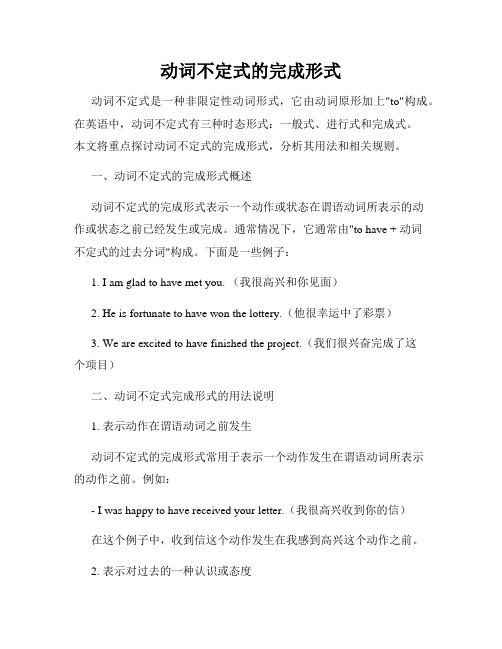
动词不定式的完成形式动词不定式是一种非限定性动词形式,它由动词原形加上"to"构成。
在英语中,动词不定式有三种时态形式:一般式、进行式和完成式。
本文将重点探讨动词不定式的完成形式,分析其用法和相关规则。
一、动词不定式的完成形式概述动词不定式的完成形式表示一个动作或状态在谓语动词所表示的动作或状态之前已经发生或完成。
通常情况下,它通常由"to have + 动词不定式的过去分词"构成。
下面是一些例子:1. I am glad to have met you. (我很高兴和你见面)2. He is fortunate to have won the lottery.(他很幸运中了彩票)3. We are excited to have finished the project.(我们很兴奋完成了这个项目)二、动词不定式完成形式的用法说明1. 表示动作在谓语动词之前发生动词不定式的完成形式常用于表示一个动作发生在谓语动词所表示的动作之前。
例如:- I was happy to have received your letter.(我很高兴收到你的信)在这个例子中,收到信这个动作发生在我感到高兴这个动作之前。
2. 表示对过去的一种认识或态度动词不定式的完成形式还可以用来表示对过去的一种认识或态度。
例如:- She was relieved to have finished her exams.(她松了一口气,考试已经结束了)在这个例子中,开始松了一口气这个动作发生在考试结束之前。
3. 表示一件错过的机会动词不定式的完成形式还可以用来表示过去错过的机会或者遗憾。
例如:- They regretted not to have attended the conference.(他们后悔没有参加这次会议)在这个例子中,错过参加会议这个动作发生在后悔这个动作之前。
4. 介词结构中的动词不定式的完成形式动词不定式的完成形式也常常出现在介词结构中。
(完整版)动词不定式的用法总结

动词不定式的用法总结动词不定式在中学英语中应用非常广泛,一方面在句中可起名词、形容词或副词的作用,同时也可在句中作主语、宾语、定语、状语和宾语补足语。
接下来为大家提供了以下:动词不定式的用法总结一动词不定式的形式一般是to +动词原形,但to有时要省去。
而动词不定式在具体运用时用不用to,取决于谓语动词的用法。
现就以下几方面介绍如下。
一、不定式结构1. 带to的不定式结构能直接跟带to的不定式结构的动词主要有:want, ask, tell, hope, learn, try, decide, forget, remember, like, love, stop, go, come等。
如:I want to go to the movies with you.我想跟你一起去看电影。
Don’t forget to turn off the light before you leave.在你离开之前别忘了关灯。
注意:动词不定式的否定形式是在不定式前直接加not,即not to do sth.。
如:Dave told me not to wake up Kate.大卫告诉我别叫醒凯特。
2. 不带to的不定式结构以下几种情况使用不带to的动词不定式:(1)在固定词组had better之后。
注意:had better的否定形式是had better not do sth.。
如:You had better go home now.你最好现在回家。
It’s cold outside. You’d better not go out.外面很冷,你最好不要出去。
(2)在let, make, see, feel, watch, hear等感官或使役动词后,要跟不带to的动词不定式作宾语补足语。
如:I made them give me the money back.我迫使他们把钱还给我。
I didn’t see you come in.我没看见你进来。
不定式的用法总结

My brother asked me to clean the room
with him.
常带 to 的不定式做宾语补足语的动词有: ask, beg, prefer, help, promise, wish, want, expect, permit, request, allow, command,
• You must remember to lock the door when you leave
• • • • • • • • • •
2. remember doing sth 记得曾做过某事 I remember locking the front door 3. forget to do sth 忘记要做某事 He forgot to do his homework yesterday 4. forget doing sth 忘记曾做过某事 I forgot saying this thing to you 5. try to do sth 努力做某事 He tries to answer each question 6. try doing sth 试着做某事 I tried singing an English song
doing指经常性动作,而 to do指一次性的动作。 I like swimming,but I don‘t like to swim now. 我喜欢游泳, 但我现在不想游。 begin\start to do sth begin\start doing sth
提示板:
• 后面只接动名词做宾的动词
巧记动词不定式作宾语歌诀:
•
• • • • • • •
想要拒绝莫忘记 (want, refuse, forget) 需要努力就学习 (need, try, learn) 喜欢帮助加同意 (like help agree ) 希望决定后开始 (hope, decide, begin, start)
- 1、下载文档前请自行甄别文档内容的完整性,平台不提供额外的编辑、内容补充、找答案等附加服务。
- 2、"仅部分预览"的文档,不可在线预览部分如存在完整性等问题,可反馈申请退款(可完整预览的文档不适用该条件!)。
- 3、如文档侵犯您的权益,请联系客服反馈,我们会尽快为您处理(人工客服工作时间:9:00-18:30)。
英语动词不定式完成式在使用语境中的学习与考查江苏省沛县湖西中学鹿俊先221611综观近年的英语高考试题,我们可以看到题目的设置往往强调语言知识在特定语境中的使用,把语言知识放在了语用层面上,即考察实际应用知识的能力。
英语动词不定式的完成式,即(to) have +动词的过去分词形式,是中学英语学习中的重点及难点知识之一,也是高考试题中频繁出现的形式。
对于这一形式考查的题目设置通常围绕三类语境,即陈述已经发生过了的事实,推测可能已经发生过了的事实,表达与过去实际情况相反的事实。
下面分别加以叙述,以便从语用角度掌握这一语言知识。
1.陈述已经发生过了的事实。
1.1.置于表示情感反应的动词、形容词、分词之后,作为引起该反应的刺激,表示情感反应之前完成的动作。
例如:I'm sorry to have given you so much trouble. (=I'm sorry that I gave / have given you so much trouble.)It is good to have finished work for the day. (=I am pleased because I have finished.)She said she was sorry to have missed you. (=She said she was sorry that he had missed you.)There was a smile on the boy's face, which seemed to show that he was happy to have given his life to his country. (=…he was happy that he had given his life to his country.)1.2.置于be said, be considered, be believed, seem, appear, happen, turn out,等之后表示这些动作之前完成的动作。
例如:I don't know whether you happen to have heard, but I am going to study in the U.S.A. this September.Charles Babbage is generally considered to have invented the first computer. (=It is generally considered that Charles Babbage invented the first computer.) He is said to have studied abroad, but I don't know which country he studied in. (= It is said that he studied abroad, b ut….)I appear to have made a small mistake. (=It appears that I made / have made a small mistake.)He seems to have missed the train. (=It seems that he missed the train.)1.3.置于should之后,表达说话人对已发生了的事实的情感的反应,如惊奇、遗憾、喜悦、不安、失望,等,should相当于汉语中的“竟然”,“居然”。
例如:They were surprised (that) a child should have worked out the problem while they themselves couldn't.It is strange that she should have married such an old man.2.推测可能已经发生过了的事实。
2.1.置于must, will, would, can't, couldn't 之后,表示很有把握的推论。
例如:The city must have been prosperous, for it enjoyed a high level of civilization.An ambulance is waiting in the street. Somebody must have been hurt or killed.--I met her soon after the war.--Oh, yes. That will / would have been around March 1946, I suppose.Jack can't have arrived yet; otherwise he would have telephoned me.--There were already five people in the car but they managed to take me as well.--It couldn't have been a comfortable journey.He must have completed his work; otherwise, he wouldn’t be enjoying himself by the seaside.2.2.置于should, shouldn't, ought to, oughtn't to之后,表示较有把握的推测。
通常意义为:正常情况/如无意外应该或不该已经……。
例如:He set off an hour ago. He ought to / should have arrived home by now.Everything had been carefully prepared, and there shouldn't / oughtn't have been any problems, I think.2.3.置于could, may, might之后,表示不太有把握的猜测。
例如:He could / may / might have been at home yesterday, but I am not sure.--Polly’s very late.--He may / might have missed her train.--What do you think that noise was?--It might have been a cat.2.4.与can, could结合用于疑问句,询问是否有可能发生了某事。
例如:Where can /could he have gone? It’s so late at night.I can’t find John in the school. Can he have gone home?My English-Chinese dictionary has disappeared. Who could have taken it?3.表达与过去实际情况相反的事实。
3.1.置于should, ought to, shouldn't, oughtn't to, could, might, needn't之后,表示应该做的事未做,不该做的事做了;可以做的事未做,不必做的事做了。
使用于指责、抱怨等场合,可分别译为“本应该……”,“本不该……”,“本可以……”,“本不必……”等。
例如:I was really anxious about you. You shouldn't have left home without a word.I told Sally how to get here, but perhaps I should have written it out for her.--I stayed at a hotel while in New York.--Oh, did you? You could / might have stayed with Babara."There was a lot of fun at yesterday's party. You ought to have come, but why didn't you?There was plenty of time. You needn't have so hurried.Tom ought not to have told me your secret, but he meant no harm.He might / could have given you more help, even though he was very busy.You might / could have told me you were coming.3.2.置于表示希望、意图意义的动词或动词词组的过去式(如:hoped, planned, expected, intended, meant, would like, were / was to)之后,表达落空了的希望、未实现的意图。
可分别译为“本希望……”、“本打算……”、“本想……”。
例如:I meant to have telephoned, but I forgot.He was to have been the new ambassador, but he fell ill.I'd like to have seen his face when he opened the letter.3.3.句子中含有假设条件从句或上下文暗示了假设条件时,置于would,should, might, could, ought to 之后,表达与已发生的客观事实不一致的结果。
不含情态意义时would用于所有人称,should仅用于第一人称。
而would, should, might, could, ought to可以含有其本身的情态意义。
例如:Yesterday, Jane walked away from the discussion. Otherwise she might have said something she would regret later.If I had worked hard at school, I should / would have got a better job.If it hadn't been for the rain, we should / would have had a good harvest.Had the management acted sooner, the strike couldn't / wouldn't have happened.If he had known the facts, he could / might have told us what to do.If he had received a present, he should have thanked her.If Bob had started at nine o’clock, he ought to have been in London by eleven o’clock.3.4.置于could, might之后,表示虽然动作并未发生,但现在看来当时存在发生的可能。
